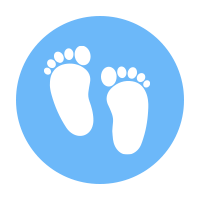- Ask your child’s doctor and/or child care teachers if your child is ready for toilet training. Most children are not successful at toilet training until 2 to 3 years old. Bladder and bowel control are usually established; and the potty chair or toilet are used. If he is not ready, it can cause stress and setbacks, which can cause training to take longer.
- Talk about your child’s emotions and give him words to help him explain how he’s feeling. Help your child manage stressful feelings by teaching him to take deep breaths, hug a favorite toy, or go to a quiet, safe place when he is upset.
- Set a few simple and clear rules that your child can follow, such as use gentle hands when playing. If he breaks a rule, show him what to do instead. Later, if your child follows the rule, recognize and congratulate him.
- Encourage your child to solve her own problems with your support. Ask questions to help her understand the problem. Help her think of solutions, try one out, and try more if needed.
- Talk about your child’s emotions and give him words to help him explain how he’s feeling. Help your child manage stressful feelings by teaching him to take deep breaths, hug a favorite toy, or go to a quiet, safe place when he is upset.
- Set a few simple and clear rules that your child can follow. If he breaks a rule, show him what to do instead. Later, if your child follows the rule, recognize and congratulate him.
- Read with your child and include books about potty training. Ask questions, such as “What is happening in the picture?” and/or “What do you think will happen next?” When she gives you an answer, ask for more details.
- Give your child instructions with 2 or 3 steps. For example, “Go to the sink and use soap to wash your hands.
- You know your child best. Don’t wait. If your child is not meeting one or more milestones, has lost skills he or she once had, or you have other concerns, act early.
- Talk with your child’s doctor, share your concerns, and ask about a developmental screening.
If you or the doctor are still concerned:
- Ask for a referral to a specialist who can evaluate your child more; and
- Call your local Missouri public elementary school in which your family resides and ask for a free evaluation to find out if your child can get services to help.
What's Next?
Download the Milestone Tracker app today!
Track your child’s milestones from age 2 months to 5 years with the CDC’s easy-to-use illustrated checklists; get tips from the CDC for encouraging your child’s development; and find out what to do if you are ever concerned about how your child is developing. Photos and videos in this app illustrate each milestone and make tracking them for your child easy and fun.













